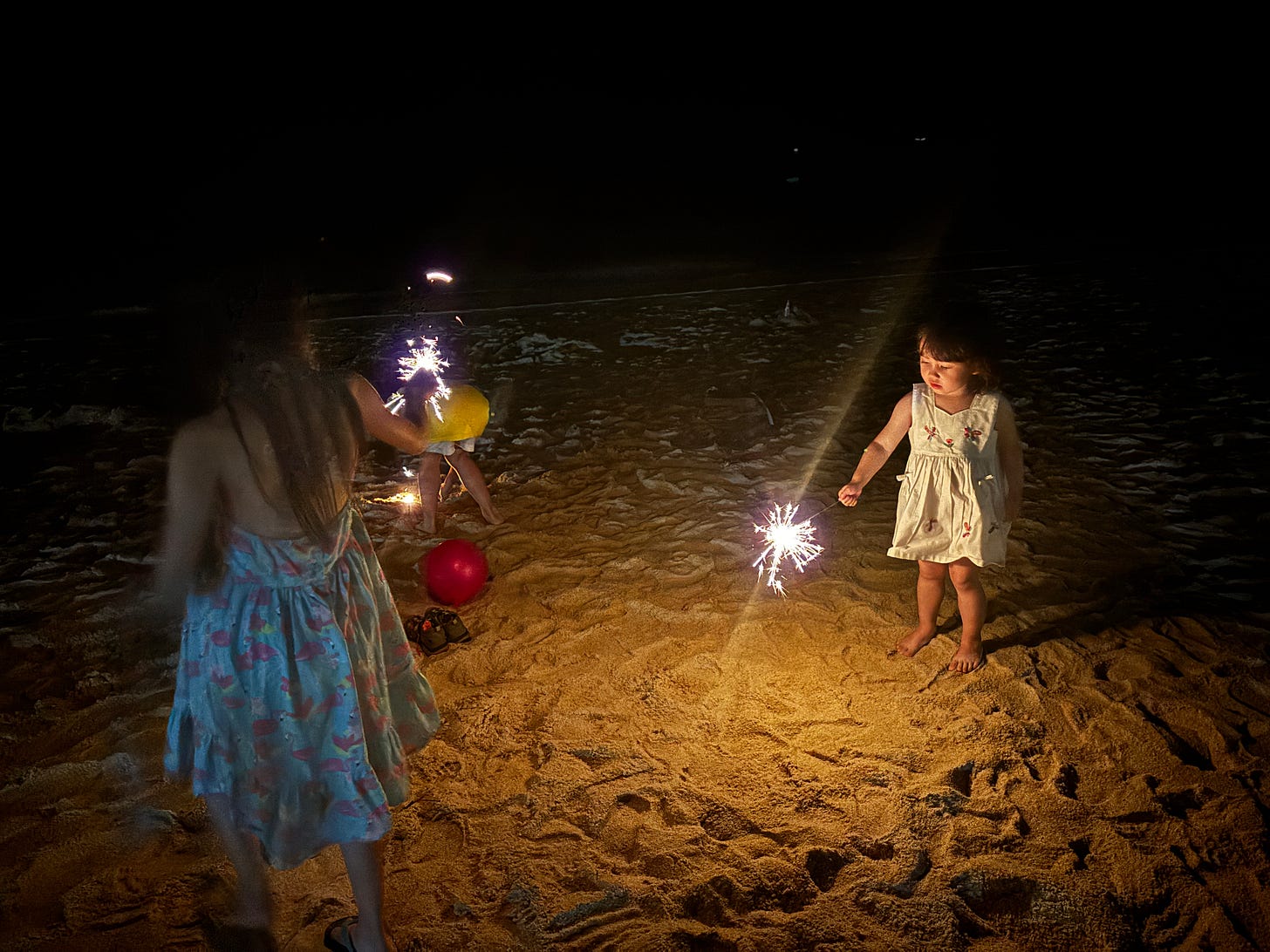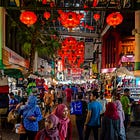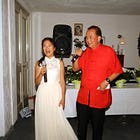As I mentioned in my previous letter, I have been back in my hometown celebrating Chinese New Year for the past few weeks. Though we’ve returned for a while, I’m still trying to pick up where I left off while juggling all the new things life is throwing my way. I hope to get back to my regular posting here soon—thanks for sticking around!
As a child, the highlight of Chinese New Year1 was receiving hong bao—red packets filled with money. We accepted them with grace, bowing slightly, hands clasped in the traditional greeting as we said, ‘Gung Hei Faat Coi!’—wishing you prosperity. Keeping a straight face, we tucked the packets away, showing neither excitement nor curiosity. But the moment we got home, we dashed to our rooms, eager to count our bounties in secret.
Growing up as a minority Chinese in Malaysia, Chinese New Year was more than just a festival—it was a symbol of my heritage. Each year, as February approached, preparations began in earnest for the celebration. Somehow, it never felt like the year had truly begun until we ushered in the Chinese New Year.
And, as with every celebration in our community, food was always at the heart of it.
I won't forget the scent of mandarin oranges lingering on my fingers after peeling yet another piece to eat. I kept the best of the peels for Ah Ma, my paternal grandmother, to dry on a large rattan dulang for weeks after under the hot Malaysian tropical sun.
Nor the sweet aroma of Ah Ma’s adzuki bean soup, boiled for hours with her self-dried mandarin peels, greeting me on Chor Yat, the first day of the new year. This was always followed by her fragrant fried Mee Hoon, generously packed with large prawns she peeled with care.
Nor the waft of oily richness rising from the dark, murky duck soup simmering in a deep stainless steel pot at my maternal grandmother Po Po’s house during Chor Yat lunch. The clang of a metal spatula against the cast iron wok echoed as my Po Po whipped up the loh hon chai, serving it last on a table already brimming with prosperous dishes.
I won't forget the fragrant buttery cookies melting in my mouth as I pop in yet another irresistible one. Only to regret later when I was presented with feasts during mealtime and found myself not hungry.
Nor the smoky, oily barbecue meat slices, long yok, sticking to my tongue and hands all greasy and sticky.
I won't forget the assault of flavors as we were served a roulette of gigantic plates of food during the Chinese reunion feast, specially prepared for the occasion: prosperity platter, steamed whole fish, giant prawns, roasted suckling pig, vegetables yam basket, and roasted whole chicken.
But Chinese New Year was more than just about food. It was about traditions—the customs that held us together, passed down through generations, shaping the way we celebrated.
In Malaysia, most Chinese families trace their roots to the southern region, and some customs from those areas are still observed today. However, many traditions have faded in my family—partly because my grandparents didn’t actively pass them down and partly because my parents didn’t continue them.
I won't forget the new dress collar scratching my neck and the sides pinching my ribs. The tropical sun offered no relief as we shuffled from house to house in stiff new clothes for pai nin—the customary New Year’s visit to family and friends.
Nor the gleeful anticipation of receiving hong baos mixed with the anxiety of facing 30 relatives, some of whom I saw only once a year, as they gathered at my Ah Ma’s house next door. The pressure was even greater because I had to address each elder by their proper title, based on rank, paternal or maternal side, blood relation, or marriage.
I won't forget the customary pai nin at Lai Ma and Lai Pa’s house. Sometimes, my god-siblings’ visit coincided with ours, filling the airy large home with laughter and excited chatter. In later years, my Lai Ma ushered me to her home-cooked celebration food-laden table in the solace of missing those of my grandmothers.
Nor the visits to one house after another on Chor Sam, the third day, with my friends. During my teenage years, my friends and I gathered enough older friends to chauffeur us around, fitting up to seven of us in four-seater sedan cars to pai nin each of our houses. Our parents waited expectantly at home for us girls to arrive to eat snacks, gamble, chit-chat, and, of course, receive hong bao from them.
At the same time, no celebrations will go by without some indulgent yet fun communal activities. Adrenaline, laughter, and raucousness filled my memories, too.
I won't forget the evenings that stretched on forever, with Formica tables unfolding in living rooms, adults surrounding them, happily rowdy and gambling with playing cards. Soon, the kids formed a circle on the floor to mimic them. Once I was old enough to join, my daddy offered me money to play: “If you win, it's yours; if you lose, it's mine.” I sulked like mad when I lost, nevertheless.
Nor the sound and light of firecrackers filling the neighborhood with mesmerizing fire sparklers in my hands. My older cousins threw Pop Pop, crackers the size of peas that popped loudly on impact, at us, the younger ones. I also watched them light bigger firecrackers that flew across the road or burst into flames with a bang.
But like all things in life, change is inevitable. As years passed, the people who visited dwindled, and the celebration muted.
Once Ah Ma left this world, the magnet that held us together was gone. A few relatives still came over out of habit, but after a few years, it too stopped. Then, my Po Po joined her, marking the end of my maternal side coming together.
My generation was not spared from disappearing, but in different ways. Some no longer return because their families have moved to the big city. Some return only every other year as they alternate with their spouses' homes. And some, like me, have moved far away.
This year, I returned with my family to celebrate this significant occasion—the first time for my children. I would be lying if I said I was giving them the same experience I had when I was young, but at least a few things remain.
Hong baos were still given out. We still had a reunion dinner with the relatives from my father’s side, albeit smaller, but enduring, with many of his siblings. A few friends who were still in Taiping came to visit. We went to Lai Ma and Lai Pa to pai nin, my oldest loved ones. My children got to meet my godbrother’s children. We went to a friend’s house to pai nin, a far cry from the heydays, but a window to it. Only gambling was missing; who has time with young children?
The Malaysian Government legalized fireworks again. We purchased approved, taxed firecrackers from the many industrious stalls that popped up all over town. I revel in seeing my children enjoying something from my childhood.
We also visited the lake garden, a highlight of my hometown. It felt surreal as my children sat on an aged, dull, dinosaur-carved stone. I had an exact picture of me sitting there when I was my son’s age, the dinosaur then shining bright.
I suppose this is how time passes—traditions slowly change, shifting from generation to generation.
My parents must have had their own version of Chinese New Year, just as I had mine. Now, I try to pass what I can to my children, even as the experience takes a different shape, especially since we live far away from home.
My children quickly learned the magic words to receive a hong bao. The moment one appeared before them, they clasped one hand over the other in the traditional Chinese greeting, smiled, and proudly declared, ‘Gung Hei Faat Coi!’ I couldn’t have felt prouder as a Chinese mother.
I watched as my son secretly opened all the hong baos in the room, counting the money he received with glee, and saw my young self mirrored back at me. I guess some things don't change.
More Malaysia musings and personal essays:
I debated with myself whether to call it Chinese New Year or Lunar New Year to be inclusive, but since I am telling the story of my particular culture—Chinese celebrating in Malaysia—I stick to the name we all know so well.






Reading it now,so redolent with food ,love and laughter. Even for us during Eid,we recieve Eidi something like you mentioned. We create new traditions while retaining some . So so relatable and now to find the food you mentioned. Ah.
A beautiful reflection, Rachel! You really have a lot of strong memories of how your family celebrated LNY. It's really interesting how traditions get reinterpreted by everyone and by different generations.